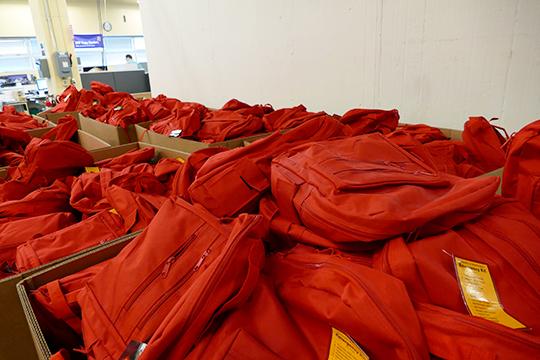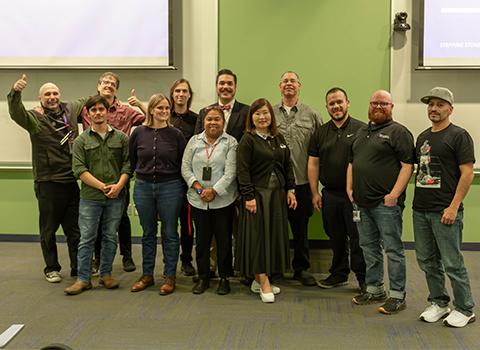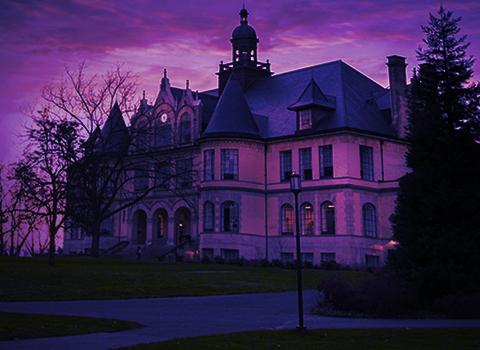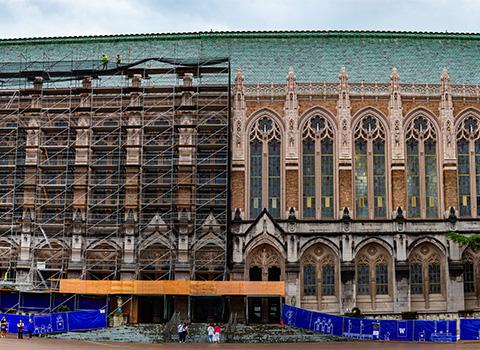Record-setting donations

Photo credit: Jayna Milan, UW Sustainability
What happens to all of the items generated by thousands of University of Washington students as they race to clear out their spaces and leave campus for the summer?
In most instances, such a mass departure would lead to illegal dumping and a staggering waste of perfectly good reusable items going into the landfill. However, UW is able to bypass these issues with two annual events hosted by UW Recycling: SCRAM (Student Cleanup, Recycle and Moveout) and Husky Neighborhood Cleanup (HNC). Both events support the local community by diverting waste and supporting local nonprofit organizations. Photo above: Jayna Milan, UW Sustainability

Left: McMahon Hall's donation station before a pick up.
Right: Adam Fehn (left), Audrey Taber and Todd Carey of UW Recycling sort and pack SCRAM donations.
Photo by Jayna Milan, UW Sustainability
Go on and SCRAM
Go on and SCRAM
SCRAM 2018 brought in a grand total of 34.74 tons of donations (or 69,487 lbs.) — an increase from 28.03 tons / 56,053 lbs. in 2017. "The total weight of donations collected this year is the highest volume on record since we officially started tracking in 2011!" said UW Recycling Program Support Supervisor Erica Bartlett.
This year’s SCRAM took place during finals week, June 4–9. Beginning in February 2018, UW Recycling began planning with campus partners UW Housing & Food Services and Facilities Services Moving & Surplus. All three groups work together in different capacities to deliver, set up and organize daily pick-ups of 14 SCRAM donation stations within 13 on-campus residence halls. (Two outdoor donation stations were provided at Stevens Court Apartments.)
With the UW Recycling administrative team at full strength — and with volunteer support from its neighbors at UW Creative Communications — the team quickly completed 99% of its donation-sorting by Tuesday, June 12. "We’re usually still sorting items five or more days after the event," said Bartlett.
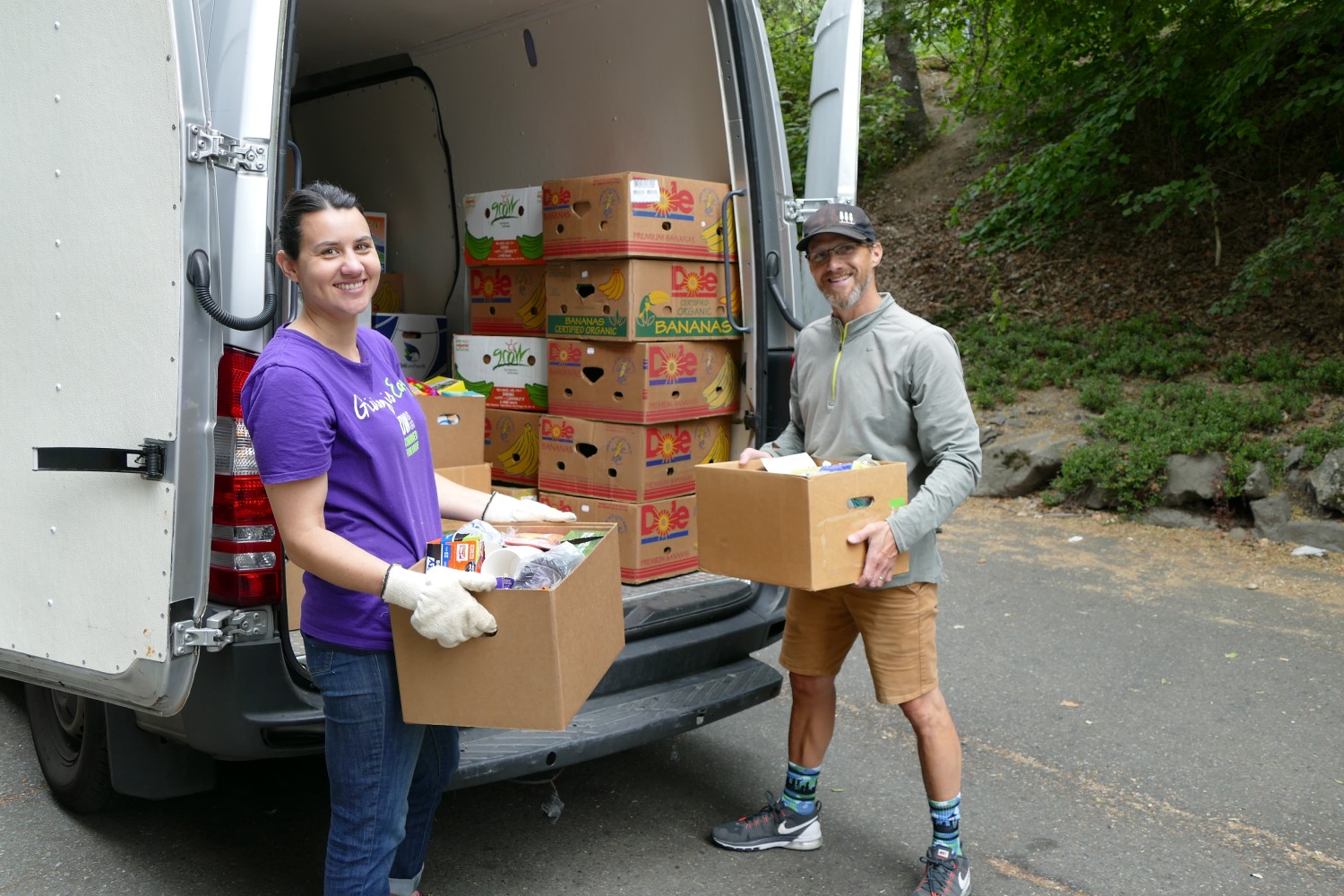
Erica Bartlett of UW Recycling (left) assists Bill Lowie of UDistrict Food Bank in loading up non-perishable food and household items.
Supporting those in need
Supporting those in need
Bedding, clothing, emergency red backpacks, electronics, home and school supplies, non-perishable food and toiletries are collected and sorted throughout the entire week before being redirected to local organizations comprised of University District Food Bank, Northwest Center and — for the first time this year — Downtown Emergency Service Center (DESC).
“Our organization’s focus is on adults who are experiencing chronic homelessness, and affected by mental, physical and substance use disorders,” explained DESC Volunteer and InKind Gifts Manager Don Rupp. “UW’s help means we can concentrate on other needs and enhance engagement with our vulnerable clients.”
“We serve more than 3,500 people every day. Many of these individuals have no income, no social security — nothing,” said Rupp. “For them to receive a bottle of lotion, shampoo or a supply of menstrual products means a lot in terms of dignity and health. Also, the red emergency backpacks give the hope of security and safety in the event of a crisis.”

Left: Dean Seaman of UW Recycling begins loading donation items bound for DESC.
Right: Don Rupp of DESC looks over the sealed pallets.
Making a difference
Making a difference
“Over 1,500 of our clients are in permanent supportive housing,” said Rupp. “DESC provides everyone brooms, mops and dustpans, but the donated household cleaning products that we received will be like gold to our residents — it means they can feel a sense of pride in their homes.”
The donations gathered at the residence halls exemplify how individual efforts can ultimately make a difference. “SCRAM is an amazing program — thousands of students providing thousands of pounds of goods for thousands of vulnerable people. Thank you.” said Rupp.
Being a good neighbor
Being a good neighbor
Husky Neighborhood Cleanup serves the north campus neighborhood while students move out of homes that comprise Greek Row. Since the northern portion of campus is technically located within the City of Seattle, UW Recycling partners with groups representing both the University and Seattle to help keep the neighborhood clean during the three days around graduation — this year falling on June 7, 8 and 11.
Service partners include Goodwill and contracted vendor Waste Management. HNC accepts garbage, recycling and furniture in good condition. However, food and toiletries are not accepted. Trucks representing each service partner strategically park on the center median of Greek Row, which allows access for students to unload materials under the supervision of UW Recycling and its vendors. This year, a total of 15.80 tons (or 31,600 lbs.) of material was removed during HNC, consisting of:
- 14.17 tons / 28,340 lbs. of garbage
- .57 tons / 1,140 lbs. of recycling
- 1.06 tons / 2,120 of reusable donations
“As a result of working closely with Seattle Public Utilities and UW External Affairs Regional Relations Office as well as our vendors (Goodwill and Waste Management) we updated the way we promote HNC,” said UW Recycling Program Coordinator Adam Fehn. “Not only did we find a large increase in the amount of material we collected this year, but we also experienced a much smoother event in general.”

Left-to-right: Jaron Skolrud of Goodwill, Chris Forbes of UW Recycling and Mike Gonzalez of Waste Management supervise drop-offs during HNC. Right: The median at 17th Ave. NE and NE 47th St. where HNC is held each year. Photo: Jayna Milan, UW Sustainability
